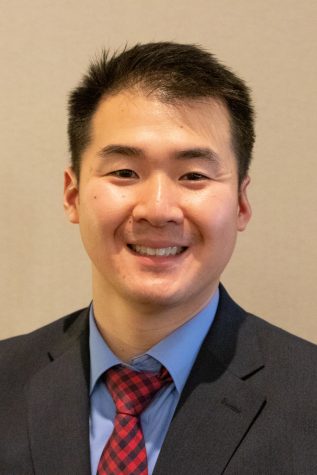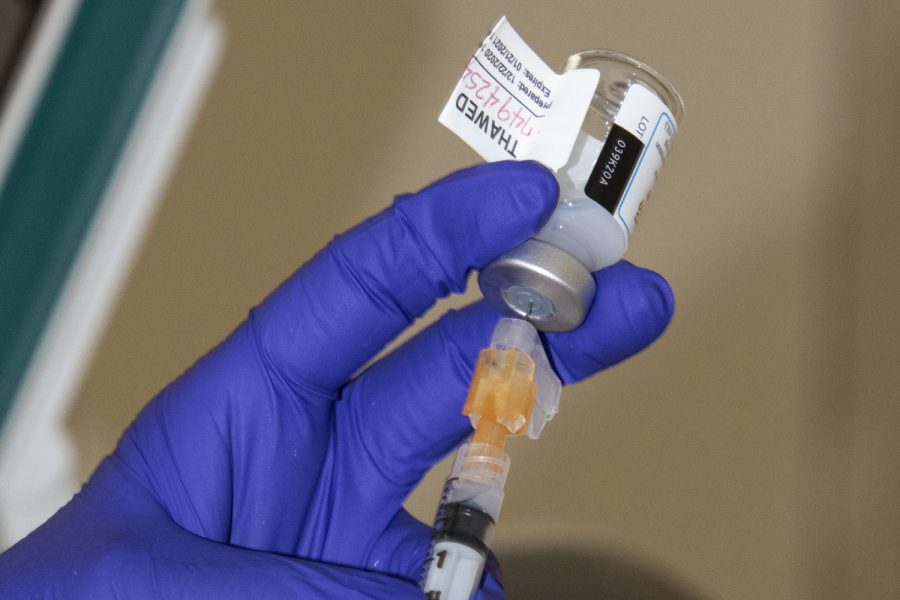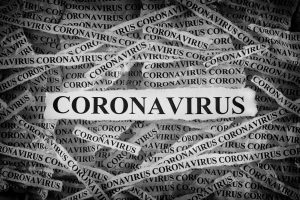Local public health officials work with community partners to address racial inequity in vaccine rollout
Local public health departments are working to create trust and promote equitable access to the COVID-19 vaccine among communities of color.
Moderna COVID-19 vaccine is drawn up on Tuesday, Dec. 22, 2020.
March 30, 2021
White Iowans are currently receiving COVID-19 vaccines at a disproportionately higher rate compared to Black and Latinx Iowans, according to a recent Kaiser Family Foundation report.
As of March 15, 21 percent of Iowa’s white population has received a COVID-19 vaccine compared to only 6 percent of Black Iowans and 5 percent of Latinx Iowans.
Fostering trust within communities of color may be an important step for public health officials as they work to get Iowans vaccinated. According to a COVID-19 collaborative report from the NAACP and UnidosUS, only 34 percent of Latinx respondents and 14 percent of Black respondents said they trusted the safety of the COVID-19 vaccine.
Johnson County Community Health Division Manager Sam Jarvis said his public health department has created a health equity group to address racial disparities and build trust in the vaccine.

“A good handful of folks on our team started a health equity workgroup with a lot of community partners to address people’s questions and concerns,” Jarvis said. “We know that when we look at lower rates [of vaccinations] in communities it’s either related to access or to vaccine hesitancy. So, we’re really making sure those vaccines are accessible and that we’re addressing those concerns.”
Public health officials in both Washington and Johnson County said that partnering with community organizations has been a key part of their efforts to ensure an equitable vaccine rollout.
“We’re working with Latinos for Washington because we want to make sure we aren’t missing something,” said Danielle Pettit-Majewski, director of Washington County Public Health. “We’ve told them, ‘We’ll do a clinic that’s just for you. We’ll have all our materials in Spanish, and we can have your leadership there.’ I talked to the priest of the Catholic Church because he does an English and a Spanish service every Sunday, and I asked, ‘How can you help me reach these community members?’ because we want them to be protected and we want them to know that they’re eligible.”
In Johnson County, Jarvis said the public health department is partnering with the University of Iowa Mobile Clinic and Iowa City Compassion, an organization dedicated to helping immigrants and refugees in the Iowa City area, to make vaccine appointments more accessible.
Iowa City Compassion Programming Director Dayrin Iovan said her organization has partnered with the UI Mobile Clinic so that community members can get vaccinated with the help of people they trust.
“Everybody knows this is a safe place for them,” Iovan said. “We adapt to their culture and try to make a comfortable place where people already know us for the work that we do so they trust us. It’s all about trust. People tend to be willing to have services here more than in other places. We’ve been blessed to help because people know they can ask any question and we’re going to make sure we can find an answer. That’s what makes us the difference.”
Over the course of the pandemic, Black and Latinx communities have seen disproportionately high rates of COVID-19 infections.
According to an NPR analysis, COVID-19 deaths among Black Americans were nearly two times greater than would be expected for their share of the population. The same data found that in 42 states and Washington D.C., cases among Latinx individuals made up a greater share of infections than was proportional to their population size.
Black and Latinx Iowans accounted for a disproportionately high percentage of confirmed COVID-19 cases in the state, according to data from April 2020. Black Iowans are about 4 percent of the state’s population but accounted for 8.7 percent of COVID-19 cases in April 2020.
The disparity was even greater among Latinx Iowans. Despite making up 6.2 percent of the state’s population, Latinx Iowans accounted for 16.4 percent of coronavirus cases.
Pettit-Majewski said her department saw these disparities in Washington County.
“For the proportion of our population that is Latino compared to how sick those individuals who got COVID-19 were, we saw that impact and it was heartbreaking,” Pettit-Majewski said.
In Johnson County, Jarvis said his public health department has absolutely seen the disproportionate impact of COVID-19 on minority communities.
“For communities that are underserved, it does impact them more so than others,” Jarvis said. “Not everyone has paid sick time. They have bills to pay and sometimes are working multiple jobs just to pay for rent and for food or for medical care. Those are hardships. And it’s tough for our team. Sometimes it’s heartbreaking to continue to ask people to quarantine because we know it’s a hardship, but it ultimately does protect others.”






